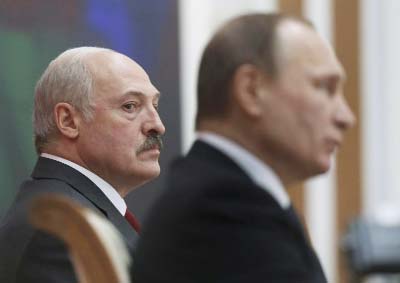
AP, Minsk :
In more than two decades in power, the autocratic leader of Belarus has cast his nation as Moscow’s closest ally, securing tens of billions of dollars in Russian subsidies.
At the same time, President Alexander Lukashenko has skillfully exploited Russia’s security fears by occasionally reaching out to the West to win concessions from Moscow. Now, the Kremlin finally seems to have lost patience with its unruly ally, spelling an end to a relationship that has been described as giving away “oil for kisses.”
The spiraling conflict between the neighbors has reached such a level that some analysts have talked about Russia possibly staging a “palace coup” against Lukashenko. Visibly nervous about Russia’s intentions, the Belarusian leader recently assured his nation of 10 million people that “there will be no war” between the two countries.
Lukashenko has sought to present Belarus as an indispensable partner for Russia and a bulwark against NATO. At the same time, he has periodically made overtures to the West, masterfully exploiting Moscow’s fear of losing a crucial ally to win more financial aid.
It now seems that Russian President Vladimir Putin has grown tired of Lukashenko’s games. A scheduled meeting between the two last week was postponed indefinitely, and Russia has set up border controls on its previously unguarded frontier with Belarus. Putin and Lukashenko never got along, and it’s hard to imagine any affinity between the cold, reserved former KGB officer and the blustery and boisterous Belarusian, a former state farm director.
Lukashenko has led Belarus since 1994, extending his rule through elections the West has criticized as undemocratic, keeping most of the economy in state hands and relentlessly cracking down on the opposition and independent media.
But Belarus’ dependence on Russia and Moscow’s desire to keep a key military ally on its western flank have helped bridge differences – until recently.
When Belarus balked last year at the price Russia charged for its natural gas, accumulating a $550 million debt, Moscow hit Minsk in its softest spot by sharply cutting oil supplies. Since the 1991 collapse of the Soviet Union, Belarus had used cheap Russian crude for products that accounted for more than a third of its export revenues. The spat escalated with Lukashenko recalling Belarusian representatives from a Russia-dominated economic alliance and ignoring its recent summit. He then raised the stakes by abolishing visas for short-time travelers from 80 nations, including the U.S. and the European Union.
In more than two decades in power, the autocratic leader of Belarus has cast his nation as Moscow’s closest ally, securing tens of billions of dollars in Russian subsidies.
At the same time, President Alexander Lukashenko has skillfully exploited Russia’s security fears by occasionally reaching out to the West to win concessions from Moscow. Now, the Kremlin finally seems to have lost patience with its unruly ally, spelling an end to a relationship that has been described as giving away “oil for kisses.”
The spiraling conflict between the neighbors has reached such a level that some analysts have talked about Russia possibly staging a “palace coup” against Lukashenko. Visibly nervous about Russia’s intentions, the Belarusian leader recently assured his nation of 10 million people that “there will be no war” between the two countries.
Lukashenko has sought to present Belarus as an indispensable partner for Russia and a bulwark against NATO. At the same time, he has periodically made overtures to the West, masterfully exploiting Moscow’s fear of losing a crucial ally to win more financial aid.
It now seems that Russian President Vladimir Putin has grown tired of Lukashenko’s games. A scheduled meeting between the two last week was postponed indefinitely, and Russia has set up border controls on its previously unguarded frontier with Belarus. Putin and Lukashenko never got along, and it’s hard to imagine any affinity between the cold, reserved former KGB officer and the blustery and boisterous Belarusian, a former state farm director.
Lukashenko has led Belarus since 1994, extending his rule through elections the West has criticized as undemocratic, keeping most of the economy in state hands and relentlessly cracking down on the opposition and independent media.
But Belarus’ dependence on Russia and Moscow’s desire to keep a key military ally on its western flank have helped bridge differences – until recently.
When Belarus balked last year at the price Russia charged for its natural gas, accumulating a $550 million debt, Moscow hit Minsk in its softest spot by sharply cutting oil supplies. Since the 1991 collapse of the Soviet Union, Belarus had used cheap Russian crude for products that accounted for more than a third of its export revenues. The spat escalated with Lukashenko recalling Belarusian representatives from a Russia-dominated economic alliance and ignoring its recent summit. He then raised the stakes by abolishing visas for short-time travelers from 80 nations, including the U.S. and the European Union.

